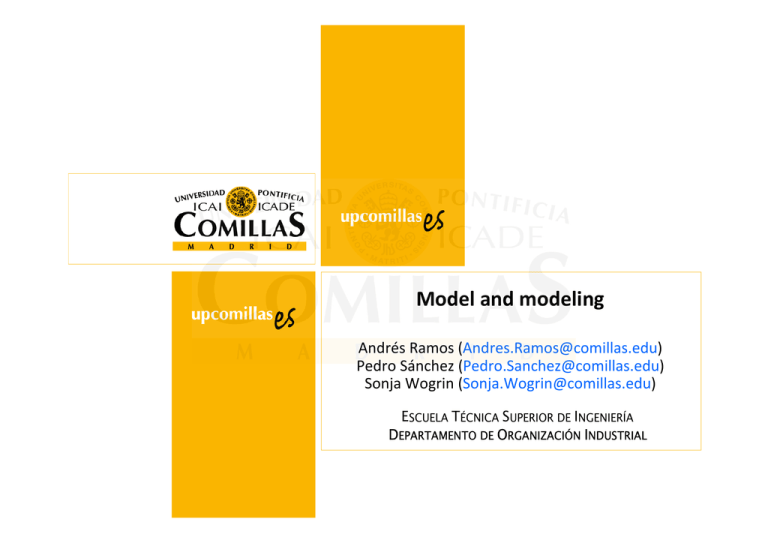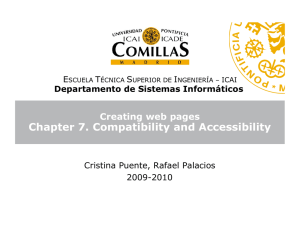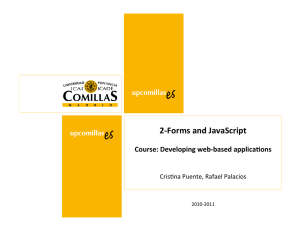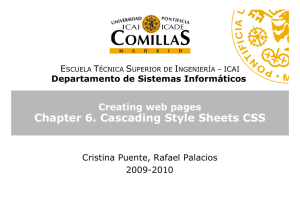Model and modeling
Anuncio

Model and modeling Andrés Ramos ([email protected]) Pedro Sánchez ([email protected]) Sonja Wogrin ([email protected]) ESCUELA TÉCNICA SUPERIOR DE INGENIERÍA DEPARTAMENTO DE ORGANIZACIÓN INDUSTRIAL Model • Definition – Esquema teórico, generalmente en forma matemática, de un sistema o de una realidad compleja (por ejemplo, la evolución económica de un país), que se elabora para facilitar su comprensión y el estudio de su comportamiento. (Diccionario de la lengua española. Real Academia Española) - Simplified description, especially a mathematical one, of a system or process, to assist calculations and predictions. (Oxford Dictionary) • • • • • • Accurate representation of a reality Decision support tool May involve a multidisciplinary team Balance between a detailed representation and the skill to obtain a solution Modeler: specifies and develops the model Expert: knows the real problem Departamento de Organización Industrial Escuela Técnica Superior de Ingeniería ICAI MODEL AND MODELING GESTIÓN DE OPERACIONES 2 Two main risks • Exhaustive model, quasi-real. It may be impossible to find an algorithm for solving the problem • Simple model to use an available algorithm. It may obtain solutions for a non existing problem • Model must be a compromise between those pathological extremes Departamento de Organización Industrial Escuela Técnica Superior de Ingeniería ICAI MODEL AND MODELING GESTIÓN DE OPERACIONES 3 Modeling • Science – – – – • Analysis and detection of relations among data Hypotheses and approximations Specific solution algorithms Model solution Art – – – – Vision and interpretation of the reality Style in modeling and documentation Elegance and simplicity in development Creative use of tools Departamento de Organización Industrial Escuela Técnica Superior de Ingeniería ICAI MODEL AND MODELING GESTIÓN DE OPERACIONES 4 Modeling benefits • • • • • • • Dialog between modeler and expert Organization of available information Structures the understanding of the problem Internalizes the organizational structure of the company Allows to share hypotheses between modeler and expert Gives an analysis tool Shows the improvement path by taking these decisions Departamento de Organización Industrial Escuela Técnica Superior de Ingeniería ICAI MODEL AND MODELING GESTIÓN DE OPERACIONES 5 Stages in model development Problem identification Mathematical specification and problem formulation Resolution Verification, validation and refinement Result analysis and interpretation Implementation, documentation and maintenance Departamento de Organización Industrial Escuela Técnica Superior de Ingeniería ICAI MODEL AND MODELING GESTIÓN DE OPERACIONES 6 Problem identification • • • • • Collection of relevant information Problem definition in vague terms Interpretation and translation to accurate terms Data are crucial, use to be the bottleneck Essential stage for the decisions being useful It is imperative to be sure that the model adequately represents the reality to be modeled. Departamento de Organización Industrial Escuela Técnica Superior de Ingeniería ICAI MODEL AND MODELING GESTIÓN DE OPERACIONES 7 Input data • • GIGOLO Garbage In, Garbage Out, Look Out ! The best model is useless if input data aren’t adequately refined Departamento de Organización Industrial Escuela Técnica Superior de Ingeniería ICAI MODEL AND MODELING GESTIÓN DE OPERACIONES 8 Mathematical specification and formulation • • • • • Definition of variables, equations, objective function, parameters Identification of problem type (LP, MIP, NLP) Emphasis in formulation accuracy and beauty Analysis of problem size and structure Categories of LP problems as a function of their size CONSTRAINTS VARIABLES SAMPLE CASE 100 100 MEDIUM SIZE 10000 10000 BIG SIZE 500000 500000 LARGE SCALE >500000 >500000 Departamento de Organización Industrial Escuela Técnica Superior de Ingeniería ICAI MODEL AND MODELING GESTIÓN DE OPERACIONES 9 Conceptual design • To a hammer, every problem is a nail. The modeling techniques and level of detail must be according to the problem structure, and to the expectation and need of the client. Departamento de Organización Industrial Escuela Técnica Superior de Ingeniería ICAI MODEL AND MODELING GESTIÓN DE OPERACIONES 10 Conceptual modeling • A month devoted to programming may “save” a couple of library hours. The time not dedicated to conceptual modeling delays the model implementation exponentially . Departamento de Organización Industrial Escuela Técnica Superior de Ingeniería ICAI MODEL AND MODELING GESTIÓN DE OPERACIONES 11 Resolution • • • • Algorithm for obtaining the optimal or quasi-optimal or, at least, satisfactory solution Find attractive quasi-optimal solutions Different solution methods Different implementations of the chosen algorithm Departamento de Organización Industrial Escuela Técnica Superior de Ingeniería ICAI MODEL AND MODELING GESTIÓN DE OPERACIONES 12 Verification, validation and refinement • • • • Debug the code Test the validity of the simplifications adopted Test the suitability to reality Extend the model to include new capabilities Departamento de Organización Industrial Escuela Técnica Superior de Ingeniería ICAI MODEL AND MODELING GESTIÓN DE OPERACIONES 13 Model: validation • The past is not stochastic 1998 Testing the model results with real system data is imperative. Departamento de Organización Industrial Escuela Técnica Superior de Ingeniería ICAI MODEL AND MODELING GESTIÓN DE OPERACIONES 14 Result analysis and interpretation • • Sensitivity analysis to the input parameter Robustness of the optimal solution Departamento de Organización Industrial Escuela Técnica Superior de Ingeniería ICAI MODEL AND MODELING GESTIÓN DE OPERACIONES 15 Implementation, documentation and maintenance • • • • Crucial stage for model success Clear, accurate and complete documentation User manual with technical, mathematical and computer specification Training of possible users Departamento de Organización Industrial Escuela Técnica Superior de Ingeniería ICAI MODEL AND MODELING GESTIÓN DE OPERACIONES 16 Linear Programming (LP) • Diet problem: – The daily minimum needs of a calf are 700 g of proteins, 28 g of calcium and 150 mg of vitamins. – The available types of food are feed and forage with a unitary cost of 0.30 and 0.35 €/kg. The nutritional composition per kg of each type of food is shown in the table below. – Determine the optimal daily amount of each food to minimize the total feeding cost. Proteins (g) Calcium (g) Vitamins (mg) Feed 30 2 10 Forage 45 1 5 Departamento de Organización Industrial Escuela Técnica Superior de Ingeniería ICAI MODEL AND MODELING GESTIÓN DE OPERACIONES 17


